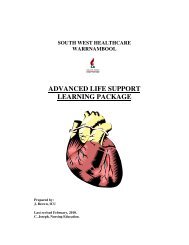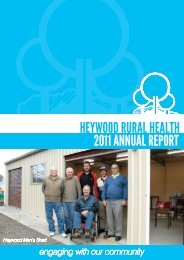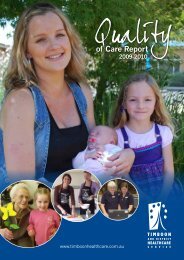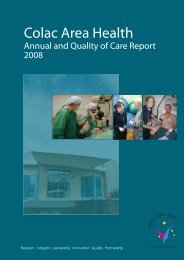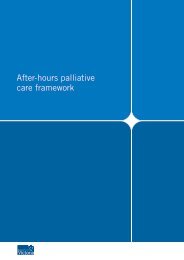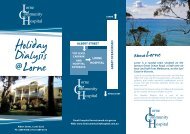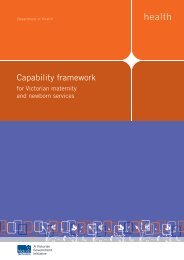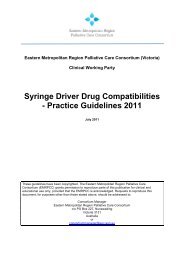Self Directed Learning Package - University of Queensland
Self Directed Learning Package - University of Queensland
Self Directed Learning Package - University of Queensland
- No tags were found...
Create successful ePaper yourself
Turn your PDF publications into a flip-book with our unique Google optimized e-Paper software.
107 • <strong>Self</strong> <strong>Directed</strong> <strong>Learning</strong> <strong>Package</strong> - Advanced Registered & Enrolled NurseTrueFalse5 It is appropriate to accept a careworker estimation <strong>of</strong> the severity <strong>of</strong> a resident’s dyspnoea if they cannotremember what rating score a resident provided them.• Because health pr<strong>of</strong>essionals tend to under-report a patient’s breathlessness the resident should be encouragedto rate the severity themselves (if cognitively aware).6 Attitudes and beliefs <strong>of</strong> residents, family and health pr<strong>of</strong>essionals can be barriers to effective pain management.• Attitudes and beliefs can cause reluctance to report pain or prescribe/administer appropriate analgesics.• Examples <strong>of</strong> faulty attitudes/beliefs include:-“People with dementia don’t feel pain”-“It’s normal to have some level <strong>of</strong> pain as you age”-“Opioids hasten death”.7 A resident with chronic pain that is moderate to severe intensity will look pale, perhaps be sweating and havechanges in their heart rate and/or blood pressure.• In palliative care, pain is usually chronic and the obvious signs such as pallor, sweating, or changes in bloodpressure may not be seen.8 A tingling, burning pain that runs around one side <strong>of</strong> the chest wall between two ribs is most likely to beneuropathic in origin.• Neuropathic pain <strong>of</strong>ten follows dermatome/nerve distribution paths.• It is described as burning, shooting, radiating, tingling, numbness, pins and needles or deep aching.9 It is up to the nurse to assess the condition <strong>of</strong> a resident’s oral health each day.• Careworkers are in an ideal position to check for problems related to oral health.• Encourage them to check and report to a nurse anything out <strong>of</strong> the ordinary at meal times, when providingmouth care, cleaning dentures etc.10 A resident with dementia exhibits fluctuating confusion and wakefulness. This is best attributed to thedementia itself.• Dementia has no diurnal effects and symptoms are progressive yet relatively stable over time.• Delirium however has short, diurnal fluctuations in symptoms; worse at night in the dark and on awakening.11 Alfred has not responded to environmental and nursing interventions for his delirium. You should questionthe GP’s order <strong>of</strong> a dose <strong>of</strong> diazepam to help manage Alfred’s hallucinations.• Benzodiazepines do not improve cognition but may help associated anxiety.• Benzodiazepines may in fact worsen delirium if not used in combination with an antipsychotic drug suchas haloperidol.



